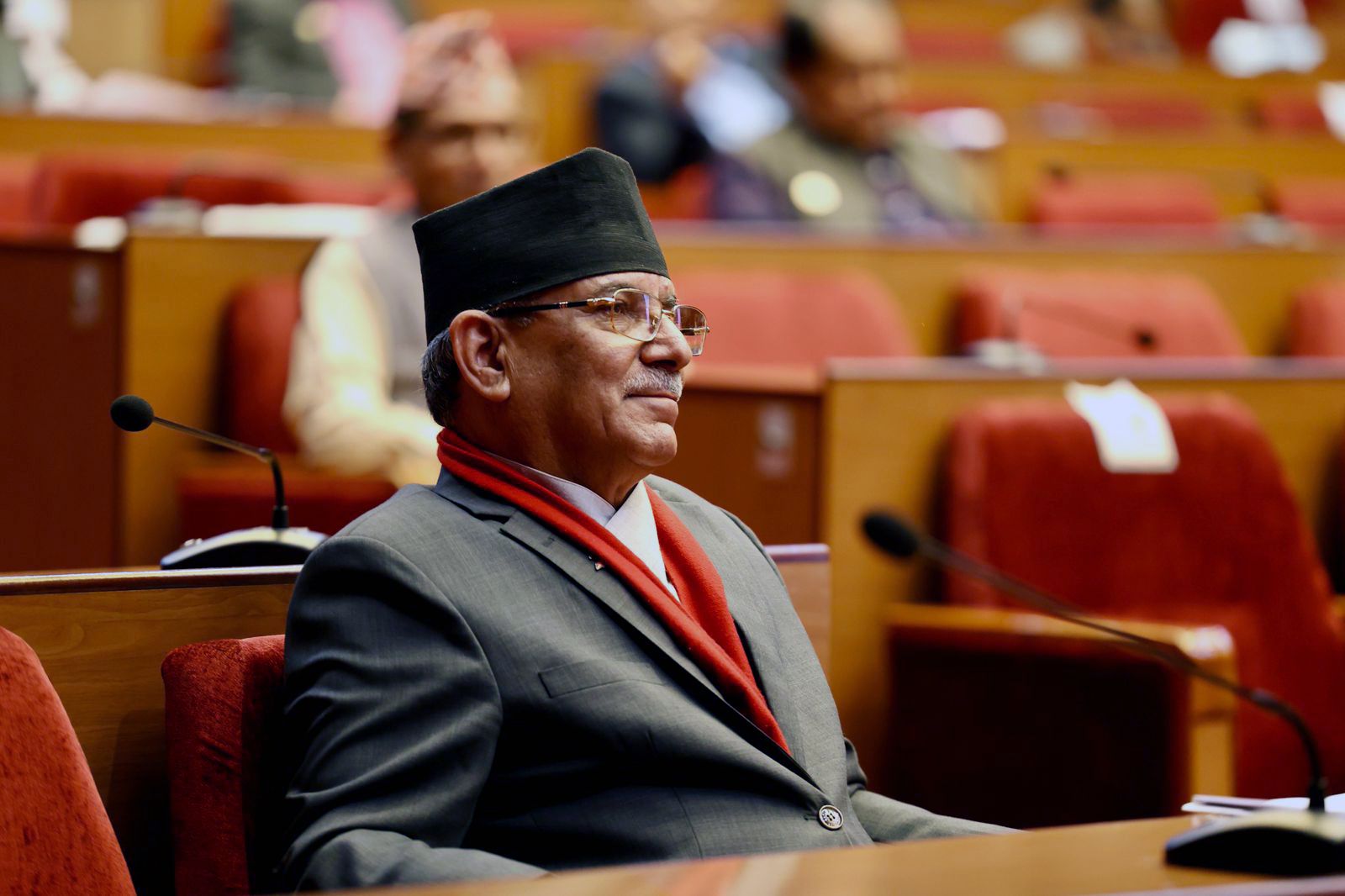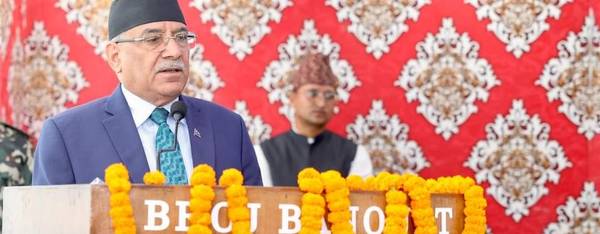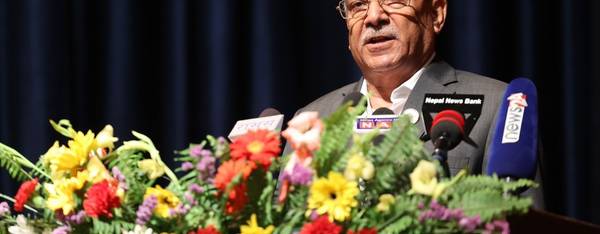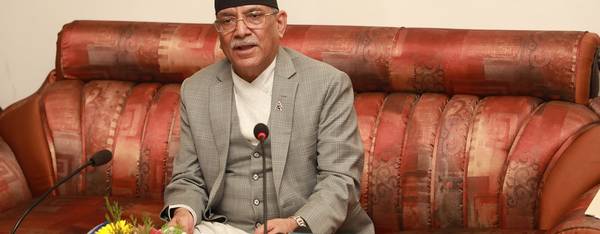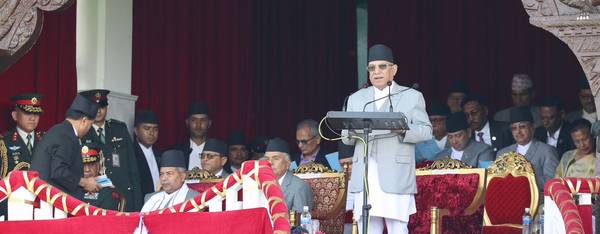 Statement by Mr. Pushpa Kamal Dahal ‘Prachanda’
Statement by Mr. Pushpa Kamal Dahal ‘Prachanda’
Prime Minister of Nepal
November 2, 2016
Convener of this Programme
Honorable Ministers,
Distinguished Guests,
Friends from Media
Ladies and Gentlemen.
It is a matter of great honour to address and inaugurate this seminar organized by the India Foundation in collaboration with Niti Anusandhan Pratishthan and the Centre for Contemporary Studies, coinciding the State Visit of His Excellency the President of India.
I am confident that this seminar will be useful in further enriching multifaceted relations that exist between Nepal and India.
Almost one and half month ago, I embarked upon the state visit of India at the invitation of Prime Minister Modiji. That visit, in my view, has contributed to strengthen the relations existing between our two friendly neighbours.
The visit provided an excellent opportunity to enhance mutual trust and confidence, to boost our friendship and rekindle an optimism for strengthened partnership.
Close on the heels of my visit, the President of India is on a State Visit to Nepal. This is the visit by the Indian President after 18 years. This visit will further consolidate our ties.
Ladies and Gentlemen,
Connected by geography, history and culture, India and Nepal share an enduring bond of
Relations –whose entirety and depth cannot be summed up by official documents and treaties alone.
Our friendship stands on a solid foundation of amity –which is unshakable.
Our friendship thrives in an atmosphere of goodwill handed down through ages.
Sometimes, there have been episodes of misunderstanding and friction. But, such transient episodes should not shake the foundation of our relations; should not and could not corrode the atmosphere of goodwill.
We share not only an open border, but also our aspiration for peace and prosperity.
We share not only our cuisines and festivals, but also a fabric of commerce and trade.
Our countries are gifted with immense resources. Ours are the lands of tremendous potentials and opportunities. And, responsibility is ours to unleash those potentials.
Our countries stand on the bastion of glorious history. They have cultivated the humanity with spirituality and civilization, wisdom and inventions.
Ours are the lands that conceived Gautam Buddha and Mahavira. Ours are the lands of Gandhi –who induced the world to walk upon the path of tolerance and non-violence.
Ours are the lands of great philosophers, creative innovators and pioneers.
And, responsibility is ours to revive that glory, redeem that splendor.
Albeit the richness of our resources, outside world equates our region with poverty and backwardness. And the responsibility is ours to change the face of our countries to a face of development, and to a face of prosperity.
To fulfill these responsibilities, we need novel vision and ideas for exploring new vistas of cooperation. We require imagination and innovativeness.
Ladies and Gentlemen,
Along with the wheel of time, our age-old relations have become more extensive, and multi-dimensional. New latitudes have emerged. New opportunities have surfaced up.
As we desire to see more dynamism and vibrancy in Nepal-India relations, we must ensure that the government’s efforts are supported by multiple stakeholders, including civil society, non-government sectors, intellectuals and business communities. They should contribute constructively to expand and deepen our relations.
We have several bilateral mechanisms and frameworks. These mechanisms must be re-activated and re-energized to fulfill their mandates. We must adapt them to the changing needs and circumstances.
It was in this spirit that our two Governments decided to form the Eminent Persons Group to look into the totality of Nepal-India relations and suggest measures to further expand and consolidate the close and multi-faceted relations between the two countries.
I am happy to note that the EPG has already started its business.
Nepal and India have cooperated in the domains of commerce and investment; transit transportation and connectivity. The importance of connectivity for land-locked Nepal cannot be over emphasized.
Infrastructures are lifelines of economic growth and development. We need to build new infrastructures, improve the existing ones, and link them to generate economic activities. We need to expand and deepen the connectivity –of infrastructures, roads and railways, of air links as well as web-links, of ideas and digital networks.
We have agreed to give priority to connectivity. We must scale up collaborations now and start working immediately.
Parallel to this, we need to focus on technology transfer and human resource development.
Nepal’s trade-deficit is widening at an alarming rate. This will not be sustainable. Our productive capacity is limited and our trade basket is small. Enabling trade facilitation measures and streamlined procedures are important to enhance our trading capacity. Specifically, we need dedicated and supportive measures from friendly Government of India to address our trade imbalances.
Water resource of Nepal is an important sector, where we need to intensify our cooperation for mutual benefit. Effective implementation of the Power Trade Agreement (PTA), which we signed in 2014, will boost up the confidence of investors. We need to ensure unrestricted market access on both sides and encourage investments.
Our immediate priority should be to make the Pancheswor Multipurpose Project a success story –a success story of shared efforts;
a success story of shared benefits;
a success story that will be an inspiring model for new vistas in energy cooperation.
Ladies and Gentlemen,
Today, problems like climate change, disaster vulnerabilities, terrorism, violent extremism and fundamentalism transcend the national boundaries. And, these cannot be addressed by the efforts of a single country alone.
Concerted and effective responses are required to slash the tentacles of such threats.
Today, development priority and agenda have gone through tremendous change. Quest for socio-economic development cannot be confined to outdated paradigms.
We need to pursue a closer collaboration to capitalize on genetic resources, biodiversity and organic farming in which we have tremendous potentials. We need to utilize our traditional knowledge. With huge human expertise at our disposal we stand a good chance to be a forerunner in technology and science. To benefit from globalization, we also need to excel in IT sector and digital economy.
Ladies and Gentlemen,
If Nepal continues to remain stagnated in the development landscape, if it continues to be grappled with the dearth of basic things; we will not be able to successfully navigate the waters of coming age. Such plight of underdevelopment will not be in the interest of our neighbours as well.
If the state of underdevelopment continues to persist, that will be an insult to our conscience; that will be an insult to the vision of shared prosperity and inclusive development.
This is the time where dignity and honour are the inalienable rights –of individuals, societies and nations. As we steer through new vistas in our relations, we must ensure that these rights of honour and dignity stand in even stronger citadel.
This is the time where societies are free to pursue their independent path of socio-economic development, where they can make a choice of development process and modality.
Yet in today’s world of interdependence, there is no alternative to mutually beneficial collaboration and partnership.
Nepal’s location in between two growing economies of India and China offers promising future. We can forge a successful tri-lateral partnership; a partnership with sole focus on economic growth and development; a partnership that will be economically rewarding and beneficial to people of all three countries.
Successful experiences of similar model of cooperation elsewhere could provide us with a useful lesson to explore the vistas offered by unfolding economic opportunities.
Ladies and Gentlemen,
Nepal-India relations are not confined only to the formal relations between two governments. People-to-people relations, cultural and civilizational bond constitute the vibrant core of our relations. Certainly, this domain of our relations must be nurtured with enhanced understanding.
There are various cultural and religious sites revered equally by our people. We can develop Hindu and Buddhist circuits incorporating the major shrines of both the countries. This will provide a powerful boost to our tourism industry.
The flow of peoples as tourists, students, workers and entrepreneurs can be a major catalyst to increase the interactions among people, to link our markets, and to explore new vistas in the people-to-people relations.
We must create an environment congenial to increase the academic collaborations, joint business ventures and partnerships.
Ladies and Gentlemen,
In the aftermath of April earthquake last year, India provided us generous assistance in rescue and relief efforts. The pledge by Indian government in Nepal’s post disaster reconstruction is substantial. The promptness of response and generosity of assistance is a testimony of our close neighbourly relations.
Cooperation between Nepal and India are multi-layered. Our membership to sub-regional, regional and multilateral forums has enabled us to pursue the issues of mutual interests.
To intensify the regional integration and development, we have worked closely in the platforms of SAARC and BIMSTEC. And, we must collaborate together to make these forums more effective. Delivery of the result is the key concern.
To complement our bilateral interactions, sub-regional cooperation, such as BBIN initiative provides useful opportunity to collaborate in critical areas of energy, transport, and connectivity, among others.
Ladies and Gentlemen,
Our relations are full of potentials. We must capitalize on them, and inject dynamism for mutual benefit.
We must engage in dialogue, act in good faith, and nurture respect from each other.
Last year, we promulgated democratic and inclusive constitution through the Constituent Assembly elected by the people of Nepal. Some voices of dissent have surfaced up in this context. My government remains committed to take everyone on board and has taken serious steps towards this end. We believe we can find an acceptable solution to all while upholding the vital national interests of Nepal.
Nepal’s democratic stability is not only essential for undertaking economic and social transformation but also for building an enduring framework for mutually beneficial cooperation between our two countries.
To conclude, I would like to underline that we have arrived at the juncture in Nepal-India relations to heed the call of time, sense new opportunities, and explore new vistas in our relations as per the wish of our people and the demand of our time.
Together, we can achieve prosperity for our people. For this, we must be pragmatic in our approach, steadfast in our commitment and determined in our action. Opportunities are there to be seized.
I thank you all.
 क. प्रचण्ड
क. प्रचण्ड
